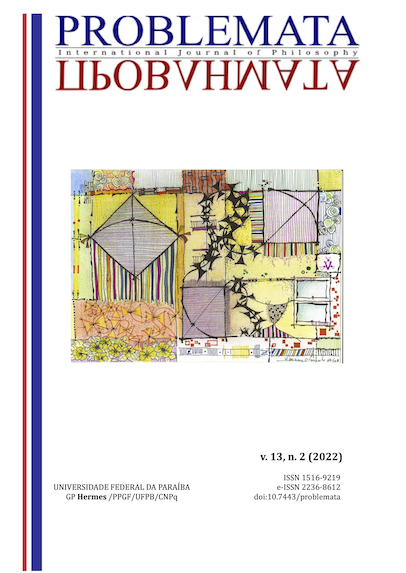FREGE ON FICTION
DOI:
https://doi.org/10.7443/problemata.v13i2.62852Keywords:
Frege, Fiction, Empty names, Assertoric force, Truth valuesAbstract
Even though Frege hasn’t articulated a metaphysics and a semantics of the fictional discourse, we can analyze his theory of sense and reference in order to establish some conclusions for fiction. My objective in this paper is to argue that, according to Frege, the central problem for fictional discourse concerns the author’s assertoric force when he narrates a story of fiction. The author, as Frege maintains in Der Gedanke, only pretends to make assertions, so fictional sentences are pseudo-assertions. The consequence of this thesis is that every proper name that occurs in fiction is, with no exception, an apparent or empty name. Consequently, as Frege states in Introduction to Logic, Logic and On Sense and Reference, fictional sentences have sense, but lack reference, which shows that fiction has the sole purpose of providing us with an aesthetic delight — not being possible, therefore, unlike scientific and ordinary discourses, to evaluate fictional sentences as either true or false. That being the case, I will critically analyze the three problems that Frege encounters in fiction: the problem concerning empty names, the problem concerning assertoric force, and the problem concerning truth values.
Downloads
References
BLACKBURN, Simon. Quasi-Realism No Fictionalism. In. KALDERON, Mark Eli (ed.). Fictionalism in Metaphysics. Oxford: Clarendon, pp. 322-338, 2005.
EVANS, Gareth. The Varieties of Reference. Oxford: Oxford University Press, 1982.
FREGE, Gottlob. Lógica. Tradução de Celso Reni Braida. No prelo, [1897].
FREGE, Gottlob. Dezessete Sentenças Básicas da Lógica. In. Lógica e Filosofia da Linguagem. Seleção, introdução, tradução e notas de Paulo Alcoforado. 2. ed. amp. e rev. São Paulo: Editora da Universidade de São Paulo, pp. 207-209, 2009a [1906].
FREGE, Gottlob. Digressões sobre o Sentido e a Referência. In. Lógica e Filosofia da Linguagem. Seleção, introdução, tradução e notas de Paulo Alcoforado. 2. ed. amp. e rev. São Paulo: Editora da Universidade de São Paulo, pp. 159-169, 2009b [1892-1895].
FREGE, Gottlob. Sobre o Sentido e a Referência. In. Lógica e Filosofia da Linguagem. Seleção, introdução, tradução e notas de Paulo Alcoforado. 2. ed. amp. e rev. São Paulo: Editora da Universidade de São Paulo, pp. 129-158, 2009c [1892].
FREGE, Gottlob. Diálogo com Pünjer sobre a Existência. In. Lógica e Filosofia da Linguagem. Seleção, introdução, tradução e notas de Paulo Alcoforado. 2. ed. amp. e rev. São Paulo: Editora da Universidade de São Paulo, pp. 129-158, 2009d [<1884].
FREGE, Gottlob. A Brief Survey of my Logical Doctrines. In. HERMES, Hans; KAMBARTEL, Friedrich & KAULBACH, Friedrich (eds.). Posthumous Writings. Tradução de Peter Long e Roger White. Nova Jersey: Blackwell, pp. 197-202, 1979a [1906].
FREGE, Gottlob. Introduction to Logic. In. HERMES, Hans; KAMBARTEL, Friedrich & KAULBACH, Friedrich (eds.). Posthumous Writings. Tradução de Peter Long e Roger White. Nova Jersey: Blackwell, pp. 185-196, 1979b [1906].
FREGE, Gottlob. Der Gedanke. Beiträge zur Philososphie des deutschen Idealismus I. Erfurt, 1918.
HUME, David. Tratado da Natureza Humana: uma tentativa de introduzir o método experimental de raciocínio em assuntos morais. 2a ed. Tradução de Débora Danowski. São Paulo: Editora UNESP, 2009.
KRIPKE, Saul. Vacuous Names and Fictional Entities. In. Philosophical Troubles: Collected Papers, Volume I. Oxford: Oxford University Press, pp. 52-74, 2011b [1974].
LEMOS, Italo Lins. What does it take for an author to create a fictional object? In. Princípios: Revista de Filosofia (UFRN), v. 28, n. 56, pp. 9-27, 2021a.
LEMOS, Italo Lins & KRAEMER, Cristian. O que é 'Metametafísica'? Uma Análise das Metodologias de Meinong, Carnap e Quine. In. GRIOT: Revista de Filosofia, v. 21, n. 2, pp. 237-255, 2021b.
LEMOS, Italo Lins. A Metafísica e a Semântica da Ficção: Uma Abordagem Artefactual. Tese (Doutorado) — Universidade Federal de Santa Catarina, Centro de Filosofia e Ciências Humanas, Programa de Pós-Graduação em Filosofia, Florianópolis, 2020.
MUNTON, Jessie. Frege, fiction and force. In. Synthese 194, pp. 3669-3692, 2016.
PARSONS, Terence. Fregean Theories of Fictional Objects. In. Topoi 1, pp. 81-87, 1982.
RECANATI, François. Fictional, Metafictional, Parafictional. In. Proceedings of the Aristotelian Society, v. 118, n. 1, pp. 25-54, 2018.
SEARLE, John. O Estatuto Lógico do Discurso Ficcional. In. Expressão e Significado: Estudo da Teoria dos Atos de Fala. São Paulo: Martins Fontes, 1995 [1975].
THOMASSON, Amie. Speaking of Fictional Characters. In. Dialectica, v. 57, n. 2, pp. 207-226.
THOMASSON, Amie. Fiction and Metaphysics. Cambridge: Cambridge University Press, 1999.
WALTON, Kendall. Mimesis as Make-Believe: on the foundations of the representational arts. Cambridge, Massachusetts: Harvard University Press, 1990.
ZOUHAR, Marián. Frege on Fiction. In. KOT’ÁTKO, Petr; POKORNY, Martin & SABATÉS, Marcelo (eds.). Fictionality-Possibility-Reality. Bratislava: Editora Aleph, pp. 103-119, 2010.
Downloads
Published
Versions
- 2022-09-29 (3)
- 2022-09-29 (2)
- 2022-09-23 (1)
Issue
Section
License
Copyright (c) 2022 Italo Lemos

This work is licensed under a Creative Commons Attribution 4.0 International License.
Authors who publish with this journal agree to the following terms:
- Authors retain copyright and grant the journal right of first publication with the work simultaneously licensed under a Creative Commons Attribution License that allows others to share the work with an acknowledgement of the work's authorship and initial publication in this journal.
- Authors are able to enter into separate, additional contractual arrangements for the non-exclusive distribution of the journal's published version of the work (e.g., post it to an institutional repository or publish it in a book), with an acknowledgement of its initial publication in this journal.
-
- Authors are permitted and encouraged to post their work online (e.g., in institutional repositories or on their website) prior to and during the submission process, as it can lead to productive exchanges, as well as earlier and greater citation of published work (See The Effect of Open Access).





